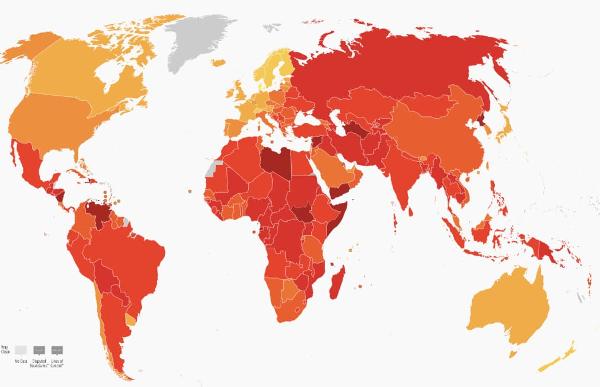New Zealand Drops to Third Place in Corruption Perceptions Index, Raising Concerns Over Transparency and Accountability

New Zealand has slipped to third place in the annual Corruption Perceptions index (CPI), which ranks countries according to their perceived levels of public sector corruption.
This is the first time New Zealand has not been in the top two of the report prepared annually by Transparency International.
The country still has one of the least corrupt public sectors in the world, but its position has declined due to a drop in business confidence in government integrity systems.
Concerns include ongoing large fraud cases, including those related to Covid-19 payments, scams that have not been addressed, and a lack of transparency regarding infrastructure projects.
The drop in score for New Zealand was primarily due to responses to the Executive Opinion Survey (EOS) undertaken by the World Economic Forum in 2023. This is one of the eight contributing assessments to the CPI.
The EOS was held between April and August 2023. There are two corruption related questions in the survey that contribute to the CPI.
- In your country, how common is it for firms to make undocumented extra payments or bribes connected with the following (scale 1-7):
- Imports and exports
- Public utilities
- Annual tax payments
- Awarding of public contracts and licences
- Obtaining favourable judicial decisions
- In your country, how common is diversion of public funds to companies, individuals or groups due to corruption (scale 1-7).
The country's top trading partner, China, also scored poorly in the index.
Australia’s score is unchanged and is now positioned at 14th.
Transparency International New Zealand
Anne Tolley, Chair of Transparency International New Zealand, acknowledged New Zealand's continued status as one of the least corrupt nations globally. However, she also expressed concern over the country's reduced score and dropped ranking, emphasising that complacency cannot be tolerated in the fight against corruption. Notably, Tolley highlighted the decrease in confidence from the business sector as especially concerning. She stressed that maintaining minimal corruption levels is vital to upholding economic stability and preserving core national values such as fairness and accountability.
Julie Haggie, CEO of Transparency International New Zealand, indicated that while high-profile prosecutions signal effective anti-corruption measures, they might also suggest poorly designed integrity systems allowing corruption to persist.
Office of the Ombudsman
The Chief Ombudsman Peter Boshier says New Zealand must be even more open and direct if it is to improve its ranking as one of the least corrupt countries in the world.
"Confidence in New Zealand around the world depends on our transparency and governance arrangements. Last week, a Public Service Commission survey found only about half of respondents thought public servants were open and transparent with information."
Mr Boshier says he has consistently highlighted the need for vigilance in this area, most recently in his report, Open For Business, which investigated the use of local council meetings and workshops.
"In that report, I called for increased transparency in decision-making. Transparency promotes trust which is at the core of the relationship between the public and its elected representatives.
"Now, more than ever, integrity agencies like the Ombudsman are a vital check in requiring clear accountability and excellence in decision-making. When we hold agencies to account, we help to uphold the perception of New Zealand as one of the most honest nations in the world."
Corruption Perceptions Index
The Corruption Perceptions Index is the leading global indicator of public sector corruption. The index scores 180 countries and territories based on expert perceptions of public sector and judicial corruption. The Index for 2023 is calculated using data from 13 external sources including the World Bank, World Economic Forum, private risk and consulting companies, think tanks and others. It is called the 2023 Index because the data is gathered during 2023, then collated and published in 2024.
Full report: https://www.transparency.org/en/cpi/2023
